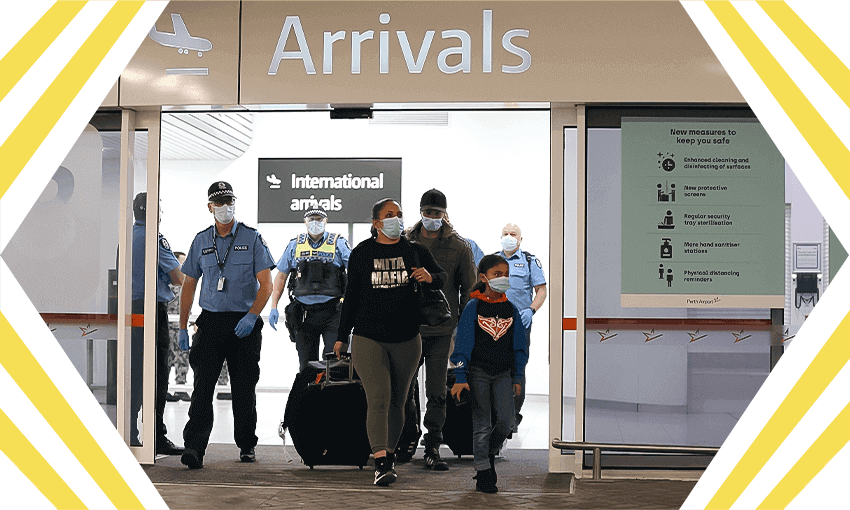It served its purpose – not without controversy – for close to two years. But MIQ in its current form clearly no longer makes sense, writes Andrew Geddis.
In her speech today on reopening New Zealand’s borders, Jacinda Ardern came both to praise MIQ and to bury it. Mandating stays in a tightly limited number of government-run facilities for all those coming into the country was, she adamantly held, the right policy for its time. And it will soon, she accepted, be an approach past its use-by date. Instead, by the end of this month there will be no numerical limit on citizens and permanent residents returning from Australia. By mid-March, number limits will go for citizens and permanent residents living anywhere in the world. And by October, we’ll be fully back to a sort-of pre-Covid travel normality.
Regarding Ardern’s claim that imposing MIQ requirements was the right thing to do, there is one number that can be undeniably pointed to with pride: 53. That is, of course, our total number of Covid deaths over the last couple of years. Flowing from the policies that underpinned it are a range of other social and economic statistics that look pretty good when compared internationally. In these terms, the choice of an elimination strategy worked, and tightly controlled borders were an essential part of that success.
However, saying that some sort of managed isolation and quarantine system was essential isn’t to say that the form of MIQ New Zealand adopted was perfect. Frankly, I don’t think many of us here in New Zealand had much of an idea of how it actually operated, beyond that it meant having to hunker down in a hotel for at least 14 days. The nuance of accessing the system simply wasn’t something we needed to worry about, given that most of us initially resigned ourselves to hunkering behind our borders while the storm raged beyond. There was something about having to hit refresh on your keyboard. And then something about a lottery. Unless you were pregnant and stuck overseas, which could mean you got an emergency spot depending on how good your lawyer and/or media game is. Or, if you were a member of a sports team that someone in government decided ought to be able to play in the country. All so much noise on top of our level changes, traffic lights, and assorted domestic dramas.
But as the after-Covid era progressed, tight border controls (shading at times into total closure) and the associated MIQ requirements have started to ascend the list of things that people notice. I wonder if this partly is because of the elimination strategy’s relative success. We got lucky with it sometimes – remember the Covid-positive Australian tourist who seemed to visit most of the wider Wellington region without infecting anyone? And even when we didn’t, as with the delta variant finally making its way into the community, it never produced the sort of mass infection (and associated deaths) that other places have suffered through. Maybe this after-Covid era wouldn’t be so bad, and so did it really need as many limits on what we can do and where we can go?
Equally, two years of life with MIQ has made that system’s demands (and foibles) more of a reality for more and more people. I don’t just mean those who have been forced to spend their money on a boat instead of their annual holiday to Europe. Rather, those of us who have been two years apart from family who happened to be making their lives outside this country. Two years in which marriages have happened, babies have been born, funerals have been held; all the human moments of joy and connection that make a life of value. The cost of either putting them on hold or missing out on them completely is cumulative in its effect. While we might sacrifice them on a temporary basis, a third year of loss becomes a real weight to put against the benefits that our elimination strategy delivered.
And now omicron has come along and made everything different. The variant’s R-value makes an elimination strategy not so much passé as a wishful dream amongst a population that is, let’s face it, over lockdowns. Its inevitable exponential spread domestically will mean that extra imported cases from outside the country will not add much more fuel to the viral fire. And just as importantly, Covid is going to go from something that we’ve avoided like, well, the plague to something that lots and lots of us are going to know someone with, if we haven’t gotten it ourselves. The stigma, if not total fear, associated with this virus will abate as familiarity starts to breed acceptance.
In that soon-to-be climate, MIQ in its current form simply cannot survive. Epidemiologically, even those committed to keeping Covid’s spread as flat as possible will find it difficult to argue that MIQ’s abolition significantly increases health risks. Legally, the justification for imposing limits on the New Zealand Bill of Rights Act guarantee of a citizen’s right to return home becomes harder and harder to sustain. And politically, the balance between avoiding blame for Covid’s spread and facing heat for an ongoing enforced isolation from the world shifts markedly.
Hence, today’s heralded farewell to MIQ. Whether it was the right policy applied in the right way, or the right policy misapplied in its details, will be something that the High Court will be asked to review on February 14. But its announced end marks the need for two shifts in our thinking about the world. First, it is something that will once again be relatively open to us. And second, it is going to be one with which we will be sharing Covid.

